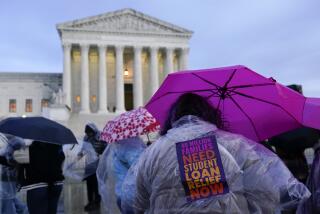Class Conflict, Countryfolk and a Choir of Candidates
For the Democrats, Super Tuesday may be a super flop. It was organized by the Southern Legislative Conference to give the South a greater voice in the Democratic Party. The idea was to force the Democrats to come up with a less liberal and, presumably, more electable ticket.
What a spectacular irony if those Democrats wake up Wednesday and find Jesse Jackson is the Democratic front-runner. And to make matters worse, the GOP contest may be all but over after Super Tuesday. The Republicans will be able to close ranks behind a front-runner while the Democrats are in disarray.
The problem is there may not be much turnout on the Democratic side, at least among white voters. There isn’t likely to be much turnout because there isn’t much of a campaign. By creating a mega-event spread across 14 Southern states, the organizers of Super Tuesday did not intensify the presidential campaign in the South. They diluted it.
No candidate has enough money to advertise in 150 television markets stretching from El Paso to Baltimore. Instead, candidates are running a “Tarmac campaign,” hopping from airport to airport to hold press conferences and get a few minutes of local news coverage.
Because the campaign is invisible, most of the Democratic candidates remain unknown. Only one Democratic candidate has widespread name recognition and a solid Southern base. That is Jackson.
Jackson is trying to break out of his black base and prove he can appeal to white voters. He has been doing pretty well--almost one in 10 voters in Iowa and New Hampshire plus strong second-place finishes in Minnesota, Maine and Vermont, states where black voters are few and far between. Jackson has spent the last few years trying to build up his support among disadvantaged whites by showing up at picket lines and farm foreclosures. He has also toned down his rhetoric.
Are whites responding to Jackson the centrist? In a word, no. Look at the kind of whites who voted for Jackson in Iowa and New Hampshire. According to The Times exit polls, they were young, well-educated and liberal. Jackson’s white supporters are not the dispossessed. They are the radical chic.
They are not voting for Jackson because of his new-found moderation but because he is the only candidate preaching the fundamentalist Democratic line. His is unapologetic liberalism: corporation-bashing, defense cuts, a $6-billion public-works program and “an international affirmative-action plan to protect organized American workers from unfair competition of unorganized foreign workers.”
Now that the campaign of Sen. Paul Simon of Illinois has faded, the race looks like Jackson and a bunch of yuppies. To readers of the Village Voice on the East Coast and Mother Jones on the West, Jackson is the only one saying anything.
Jackson’s message may still be getting across to dispossessed white voters, however. But not from Jackson. Rep. Richard A. Gephardt of Missouri has enjoyed a good deal of success by stealing Jackson’s lines and selling his message to whites. Gephardt calls for Americans to “regain control of our economic destiny” by getting tough with our trading partners and refusing to accept economic decline as “a fact of life.”
What is emerging in the 1988 campaign is class politics in its peculiarly American form: resentment of elites. Gephardt’s message is economic resentment. Control of our destiny, Gephardt says, “has been lost to foreign powers and private interests.” He lambastes “the Establishment,” which he defines as “academics, editorial writers and some who have a vested interest in not changing.” Observes Jackson: “The message is winning.”
Gephardt’s supporters are older, poorer and more blue-collar than Democrats who support Gov. Michael S. Dukakis of Massachusetts, the current front-runner in the delegate race. Gephardt also appeals to men and Democrats who have been voting Republican in recent years. So his nomination might solve some of the Democratic Party’s problems. But first he has to win the nomination, and that means he has to defeat the new elite that has taken over the party.
No one symbolizes that elite better than Dukakis--a suburban reformer who believes in good government. He is committed to process. As a reporter covering the campaign recently observed, Gephardt will take a dry issue like trade and infuse it with emotion. Dukakis takes a stirring issue like Nicaragua and de-emotionalizes it. Asked what he feels passionately about, Dukakis replied, “I am passionate about housing.”
The Dukakis message is management. He will use government to manage economic growth, and he will use Harvard’s Kennedy School of Government to manage the government. Rather than attacking corporate greed as Gephardt and Jackson do, Dukakis sees business as a partner. Dukakis’s theme of “economic growth and jobs” ought to appeal to blue-collar workers; he is a Democrat, after all. But it is a far different approach from Gephardt’s.
What Gephardt offers is advocacy: I will use federal power to protect you against economic adversity. We will wage war on unfair foreign competition and corporate greed. What Dukakis offers is competence: I will use federal power to target economic resources where they are most needed. Then everyone will prosper.
Sound familiar? The split between Gephardt and Dukakis is much like the split between Walter F. Mondale and Gary Hart four years ago. Hart was the technocrat who believed in using government to solve problems. Mondale was the advocacy politician who believed in using government to serve people’s interests. There is one big difference, however. In 1984, Mondale, the advocacy politician with the blue-collar base, was the Establishment candidate. Hart, the technocrat with the yuppie following, positioned himself as the insurgent.
In 1988, those positions are reversed. Dukakis is favored by the party Establishment and he has raised much more money than other Democrats. His campaign bears a strong resemblance to what was called “Mondale Inc.” Dukakis even offers supporters a “Dukakis for President Gold Card” if they give the maximum contribution.
Gephardt is running as the outsider. He has a message, but not much money. He also has competition for the populist vote from Sen. Albert Gore Jr. of Tennessee. Gore took a risk by waiting until Super Tuesday to join the campaign. He expected to become the alternative to whatever Northern liberal front-runner came out of Iowa and New Hampshire. But Gephardt upset Gore’s plans. The Iowa win gave Gephardt a prior claim to be the “stop Dukakis” candidate.
Gore has money but no message. As he may discover on Tuesday, it is hard to get Southerners to come out and vote for you unless you ask them to make some kind of statement. In 1976, Southerners voted for Jimmy Carter to make a statement against George Wallace. They voted for Carter again in 1980 to make a statement against Edward Kennedy. In 1984, Sen. John H. Glenn Jr. of Ohio looked to the South to revive his campaign. But there was no statement involved in voting for Glenn, and so few Southerners bothered.
Gore locked up the support of the Southern Democratic Establishment by making a statement against Iowa and New Hampshire. But, as he has begun to find out, that is not a statement most ordinary Southerners care about. So getting a bit desperate, Gore has decided to steal the Gephardt and Jackson message. He now calls himself “the champion of working men and women.
Gore has discovered the same thing Gephardt did--working-class voters resent the takeover of U.S. politics by upper-middle-class activists. Both the Democratic and Republican parties have become elitist, and both are facing class-based insurgencies. These insurgencies have roots in the 1960s, when new political movements altered both major parties.
During the 1960s, the civil rights and anti-Vietnam War movements brought a new liberal elite into the Democratic Party. These activists were concerned with social issues and foreign policy--until the national agenda shifted to economics in the late 1970s and early 1980s. Challenged by Reaganism, liberals decided to reform the Democrats’ approach to economic policy.
Instead of big government, we would have efficient management of economic growth. In 1984, Hart became the first candidate to articulate this new economic doctrine. Dukakis is the second.
Like Hart before him, Dukakis appeals to voters in the growth sectors of the economy--high technology, information processing and services. Gephardt, like Mondale, draws his support from declining sectors like farming and manufacturing. What differentiates the two constituencies is whether they feel threatened by change. Dukakis voters like to talk about “the future.” The future makes Gephardt voters anxious.
Republicans are facing the same kind of class insurgency. It, too, has roots in the 1960s. Barry M. Goldwater, Richard M. Nixon and Spiro T. Agnew brought a new populist element into the GOP--racial and religious conservatives who resented the liberalizing trends of modern society. Under Ronald Reagan, the GOP became a coalition of forces sharing an interest in limited government. Now the class division is beginning to break out.
It was Sen. Bob Dole of Kansas who brought the class issue into the 1988 GOP campaign. Dole told voters he was “one of us” while criticizing Bush’s privileged background. “I got here the old-fashioned way,” Dole recently told Georgia legislators. “I earned it. Nobody gave it to me.” The Republican primaries so far do not reveal much of a class split between Bush and Dole supporters, however. Both candidates appeal to well-educated, high-income voters. The choice between Dole and Bush is between two success stories--the self-made man versus the silver-spoon candidate. There are two old-fashioned ways to make money, after all. One is to earn it, the other to inherit it.
Marion G. (Pat) Robertson is the real Republican populist. His supporters are lower income and less well-educated. They are also deeply resentful of the GOP Establishment. Robertson’s wild accusation that Bush has a secret strategy to use “religious bigotry” against him plays on his followers’ well-developed sense of persecution and conspiracy. He is trying to energize evangelical voters and get them to the polls on Tuesday. Robertson’s rhetoric may make it difficult for him later, when he wants to broaden his base. But unless his base comes out for him this week, there won’t be any later.
Robertson’s populism, like that of Gephardt, comes from people who feel threatened by change. Robertson wants to reverse the nation’s “tragic moral decline” and “find a common ethical standard that will bring us back to traditional conceptions of morality.” In other words, moral protectionism.
The United States is the world’s most dynamic society. That means we always have to contend with change. In addition, it means we always have to contend with the resentment of change. In politics, resentment of change usually means populism--the resentment of elites. What we are seeing now is economic populism in the Democratic Party from voters who feel threatened by economic decline. And we are seeing social populism in the Republican Party from voters who feel threatened by moral decline. These fears may be irrational. But they cannot be ignored.
More to Read
Get the L.A. Times Politics newsletter
Deeply reported insights into legislation, politics and policy from Sacramento, Washington and beyond. In your inbox three times per week.
You may occasionally receive promotional content from the Los Angeles Times.






